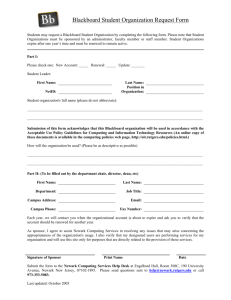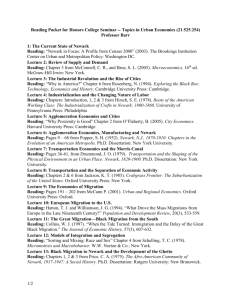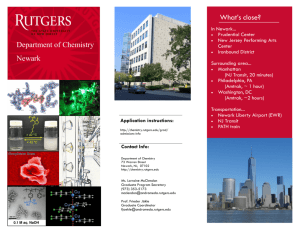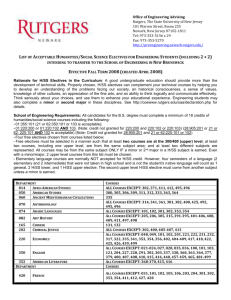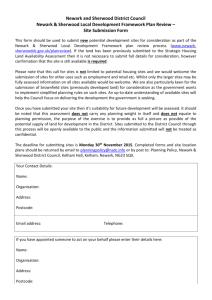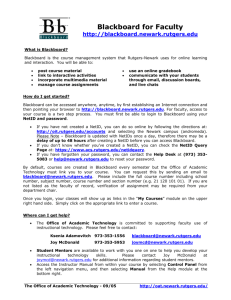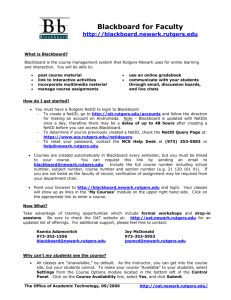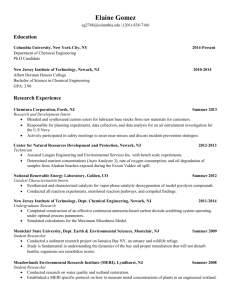220: 353 Urban and Regional Economics - Rutgers
advertisement
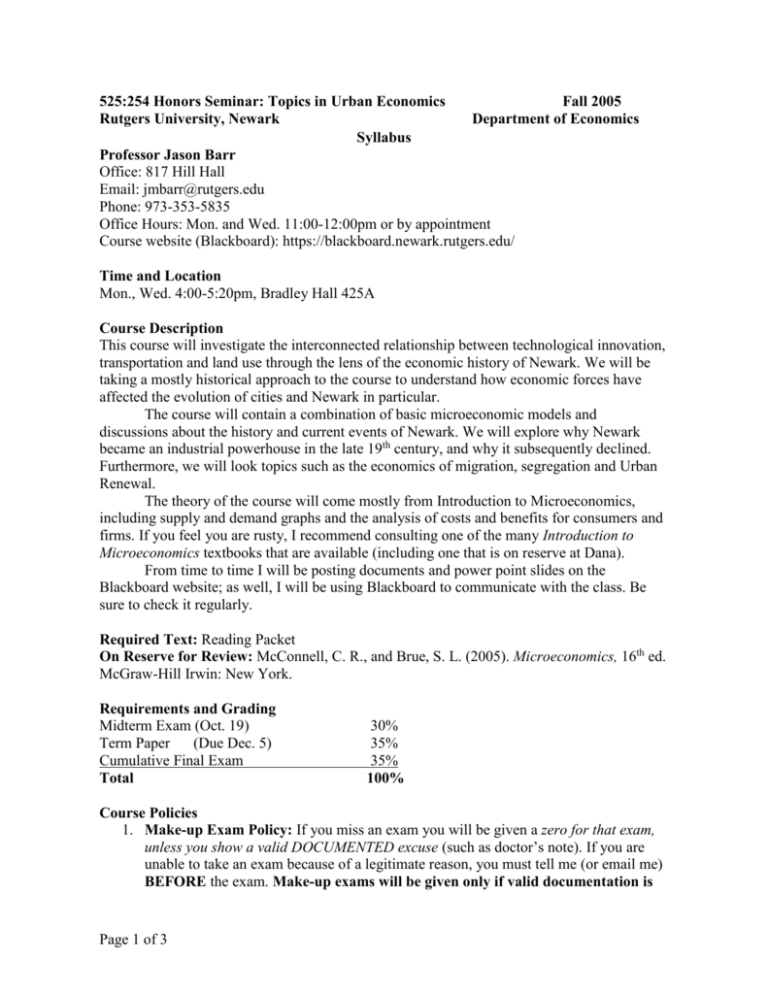
525:254 Honors Seminar: Topics in Urban Economics Fall 2005 Rutgers University, Newark Department of Economics Syllabus Professor Jason Barr Office: 817 Hill Hall Email: jmbarr@rutgers.edu Phone: 973-353-5835 Office Hours: Mon. and Wed. 11:00-12:00pm or by appointment Course website (Blackboard): https://blackboard.newark.rutgers.edu/ Time and Location Mon., Wed. 4:00-5:20pm, Bradley Hall 425A Course Description This course will investigate the interconnected relationship between technological innovation, transportation and land use through the lens of the economic history of Newark. We will be taking a mostly historical approach to the course to understand how economic forces have affected the evolution of cities and Newark in particular. The course will contain a combination of basic microeconomic models and discussions about the history and current events of Newark. We will explore why Newark became an industrial powerhouse in the late 19th century, and why it subsequently declined. Furthermore, we will look topics such as the economics of migration, segregation and Urban Renewal. The theory of the course will come mostly from Introduction to Microeconomics, including supply and demand graphs and the analysis of costs and benefits for consumers and firms. If you feel you are rusty, I recommend consulting one of the many Introduction to Microeconomics textbooks that are available (including one that is on reserve at Dana). From time to time I will be posting documents and power point slides on the Blackboard website; as well, I will be using Blackboard to communicate with the class. Be sure to check it regularly. Required Text: Reading Packet On Reserve for Review: McConnell, C. R., and Brue, S. L. (2005). Microeconomics, 16th ed. McGraw-Hill Irwin: New York. Requirements and Grading Midterm Exam (Oct. 19) Term Paper (Due Dec. 5) Cumulative Final Exam Total 30% 35% 35% 100% Course Policies 1. Make-up Exam Policy: If you miss an exam you will be given a zero for that exam, unless you show a valid DOCUMENTED excuse (such as doctor’s note). If you are unable to take an exam because of a legitimate reason, you must tell me (or email me) BEFORE the exam. Make-up exams will be given only if valid documentation is Page 1 of 3 given AND I have been notified ahead of time that you can’t take the regularly scheduled exam. The exam may be different than the one given in class and may also be more difficult. 2. Cell phone policy: You must shut off your cell phone when in class. A ringing or buzzing cell phone is a disruption. It is rude to both your fellow classmates and the professor. In order to give you an incentive to follow this rule, the following punishment will apply. The first offence will result in a warning. Each offence thereafter will result in a pop quiz for the entire class. 3. Email policy: While email is a preferred method of communication (besides office visits directly), I strongly urge you to follow proper ‘netiquette’ when sending emails. Beyond this course, you will only harm your chances for success if you address colleagues and co-workers with sloppy, slang-filled emails. If I find that you are not following the proper guidelines, I will be posting on Blackboard a special webpage devoted to poorly scripted emails. Please adhere to the following guidelines: a. Grammar: I am NOT your chat buddy, nor am I a recipient of your instant messages. Rather an email to me is a letter to a professor; as such, you should adhere to proper grammar. b. Abbreviations: Again, I am NOT your chat buddy. Do not use abbreviations such a ‘u’ for ‘you,’ ‘4’ for ‘for,’ etc., etc. c. Salutations: Again, I am NOT your chat buddy. Do not address me as ‘Hey Prof’ or something as equally colloquial and inappropriate. d. Proofread: Proofread all emails to avoid above-listed error. I urge you to read Rutgers “Guidelines for Electronic Communication” at http://www.nbcs.rutgers.edu/newdocs/gen00201/gen00201.php3 4. Attendance is mandatory. I would prefer not to take attendance, BUT if class attendance drops below 75%, I will begin taking attendance and more than 2 unexcused absences will result in an automatic drop of one letter grade. (I will announce ahead of time any changes in the attendance policy.) 5. Cheating and Academic Dishonesty will NOT be tolerated and will be prosecuted to the full extent of university regulations. To familiarize yourself with these regulations see the University Policies (http://cat.rutgers.edu/integrity/policy.html). 6. Please check the Blackboard website regularly for announcements, documents, class cancellations, etc. Page 2 of 3 Course Format and Outline As the title of the course indicates, we will be talking about selected topics in Urban Economics. Each topic will generally contain two types of discussions. The first will be about a particular economic concept (i.e., economic theory); the second will be about a particular application of the theory, usually related Newark. This outline is a general roadmap of the course, and is subject to change. Lecture 1: Lecture 2: Lecture 3: Lecture 4: Lecture 5: Lecture 6: Lecture 7: Lecture 8: Lecture 9: Lecture 10: Lecture 11: Lecture 12: Lecture 13: Lecture 14: Lecture 15: Lecture 16: Lecture 17: Page 3 of 3 The Current State of Newark Review of Supply and Demand The Industrial Revolution and the Rise of Cities Industrialization and the Changing Nature of Labor Agglomeration Economies and Cities Agglomeration Economies, Manufacturing and Newark Transportation and Economics Transportation and the Separation of Economic Activity The Economics of Migration European Migration to the U.S. The Great Migration—Black Migration from the South Models of Integration and Segregation: The Schelling Model Black Migration to Newark and the Development of the Ghetto The Economics of the Housing Market Housing Abandonment in Newark Urban Renewal in the United States Revitalization and Gentrification
